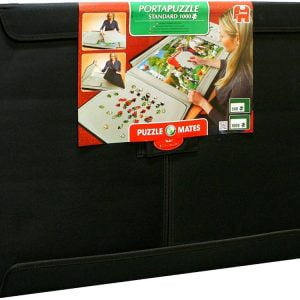Description
Parzival 1000 PC Heye Jigsaw Puzzle
Heye Jigsaw Puzzle Parzival Inside Neuschwanstein is illustrated with a deadly dual between two warriors and their horses.
Castle Neuschwanstein, near Fussen, unlike any other cnstructin in Germany, stands witness to the ideals and desires of the Baravian King Ludwig 11 (1845 – 1886)). This was his preferred refuge, this was the place where he escaped into a dream world, represented in a positive and artistic way by the murals of the most beloved poetic sagas of the Middle Ages.
The legend of Parzival tells of man’s quest for the Grail, the source of life and abundance.
Parzival was the son of Gahmuret and Herzeloyde (valour and heartache). Gahmuret lived a life of moderation. He was not given to boasting, he was humble when showered with honours and was never vainglorious. He also refused to join anyone’s retinue. Gahmuret recognised only a single authority and that was his own heart.
After Gahmuret married Herzeloyde, the queen of three countries, he embarked on a crusade in the Near East. There he was killed before his son Parzival was born. Herzeloyde’s sorrow was immense. She withdrew to a castle in Scotland, where she and Parzival lived far from the world’s turmoil.
The land was ruled by King Arthur, whose knights of the round table practised knighthood and engaged in battle. And there were battles aplenty. In the hope that Parzival would never go to war, unlike his father, Herzeloyde had instructed everyone in the castle never to mention the king, knights and war to Parzival. To Parzival there was but one king and that was God. The angels were God’s knights.
Parzival was a handsome and strong young man with a good heart. He loved his mother, as well as nature and hunting. But this produced an internal conflict. As his prowess with the javelin improved, he became increasingly torn between his love of nature and the thrill of the hunt.
One day, the pursuit of a young roe brought Parzival to the boundaries of the family estate. There he heard three knights on horseback approaching. He stepped onto the path and saw men unlike any he had ever seen. Even the horses they rode were splendidly tacked up. Parzival could not help but think they were a group of angels. He dropped to his knees in the middle of the path and praised the Lord for sending his angels.
The knights were forced to come to a halt in front of the kneeling lad. They were surprised to find a young man of such noble countenance so ignorant to think they were angels. They told him they were King Arthur’s knights on their way to Camelot.
Thereupon Parzival went to his mother, told her what he had just witnessed and said: “Mother, I want to become a knight. Give me a horse.” Herzeloyde’s heart broke a second time. She knew she could no longer hold Parzival back and granted him permission. But she came up with a cunning trick. “If people laugh at him, he’ll soon return to me,” she thought. So she made a jester’s costume out of linen and gave him an old and worn-out horse. Parzival had never been at a king’s court. He knew nothing of kings, princes and knights and therefore nothing of court jesters. And so he thanked his mother from the bottom of his heart. Upon parting, Herzeloyde gave him this wise counsel:
“If you take the unbeaten paths, you must pass murky fords but bravely enter those that are shallow and clear.
Endeavour to be polite and greet all those you meet.
If a wise old man wants to teach you manners, which he is in a good position to do, always do as he says and never lose your temper with him.
Son, if you can obtain the ring and the greeting of a good woman, you’d be well advised to accept. It will deliver you of all sorrow. Be quick to kiss her and take her firmly in your arms. If she is chaste and good, she will bring you happiness and make you proud.”
Parzival promised to follow her good counsel and dressed in his jester’s costume and seated on his old nag he set off.




